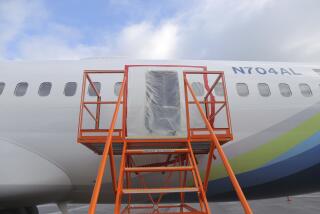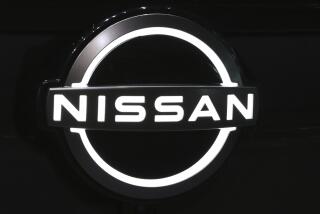Lawmakers seek answers from Takata, U.S. on faulty air bags
Lawmakers expressed frustration Tuesday over the progress of a recall of millions of defective air bags, pointing out that it’s still unclear what’s causing the air bags to rupture, which vehicles need repairs and whether replacement air bags are truly safe.
“Every morning I feel like I am playing headline roulette, waiting for another rupture, another injury, another death,” Rep. Michael Burgess, R-Texas, said at a subcommittee hearing to question federal regulators and officials from Takata Corp., the Japanese company that makes the air bags.
Faulty inflators inside the air bags can explode with too much force and spew shrapnel into the passenger compartment. The problem is responsible for six deaths and over 100 injuries worldwide.
Takata agreed last month to expand recalls of driver and passenger air bags from around 16 million to 33.8 million under pressure from regulators. The recalls, which affect 11 automakers, began in 2008 but gained steam after a government investigation last year. Committee documents show automakers so far have completed between 15 percent and 35 percent of the air bag repairs, a rate that concerned committee members.
Another concern: After years of testing by Takata, regulators and outside parties, a root cause for the problem has yet to be identified.
Mark Rosekind, head of the National Highway Traffic Safety Administration, called the recall one of the largest and most complicated in U.S. history. He said the government may never actually know exactly what led to the ruptures. NHTSA is now overseeing the recall and coordinating repairs.
Takata Executive Vice President Kevin Kennedy said based on 50,000 tests to date, the company believes the ruptures are related to long-term exposure — over 7.5 to 12 years — to high heat and high humidity and problems with design and manufacturing.
Lawmakers also sought assurances that replacement air bags were safe. They zeroed in on the fact that Takata continues to make air bags with ammonium nitrate, a volatile propellant that Takata believes has contributed to the ruptures.
“Why would you put, in a car, a potentially dangerous air bag?” said Rep. Jan Schakowsky, D-Ill. Schakowsky pointed to Angelina Sujata of Columbia, South Carolina, who attended Tuesday’s hearing. Sujata was injured by shrapnel when her air bag deployed in a 2012 accident in her Honda Civic. She says she has permanent scarring and lingering pain in her chest.
Kennedy reiterated Takata’s belief that air bags that are properly designed and manufactured can use ammonium nitrate. He said the company has changed the design of its driver side air bags and their mix of chemicals. He also said half of the 750,000 replacement kits the company shipped last month were made by competitors and don’t use ammonium nitrate. Takata also is phasing out the chemical, he said.
“Overall, you will see our production of ammonium nitrate go down, rapidly,” he said. “It certainly got a bad reputation through all of this.”
Kennedy acknowledged that some car owners who have already gotten replacement air bags may need to get an air bag with a different design. He said Takata has 60 days to develop a plan with automakers to alert people who need to get their air bags replaced again.
When asked by Rep. Marsha Blackburn, R-Tenn., if his family drove cars with Takata air bags, Kennedy said they do. Earlier, Rep. Fred Upton, D-Mich., told of a recent incident where he struck two deer with this Ford Explorer and the air bags deployed.
“I remember thinking, `I’m very lucky I didn’t have a defective Takata air bag,”’ Upton said. “And then I thought, `the safety of your air bag can’t be a game of luck.”’
Rosekind said drivers should check NHTSA’s Web site, safercar.gov, weekly to see if their car is being recalled. The agency is still getting lists of affected vehicles from automakers. He said it will be fall before the agency has a timeline for all the repairs to be completed.
Rosekind urged Congress to approve funding for his agency that the White House has requested for improvements in safety investigations. The Obama administration wants to raise the maximum amount automakers and suppliers can be fined for delaying a recall from $35 million to $300 million and to give NHTSA the authority to mandate a recall if there is an imminent danger.
“Fixing this problem is a monumental task. Yet the agency must manage this enormous and necessary task with its existing people, technology and authorities,” he said.
He noted on NHTSA’s staff, just 8 people are responsible for trying to sort through 80,000 consumer complaints each year.
“That’s delinquency on our part,” said Rep. Tony Cardenas, D-Calif.
More to Read
Inside the business of entertainment
The Wide Shot brings you news, analysis and insights on everything from streaming wars to production — and what it all means for the future.
You may occasionally receive promotional content from the Los Angeles Times.










